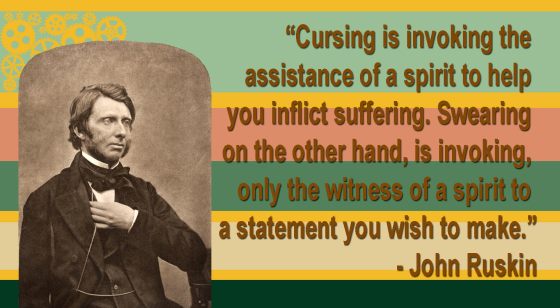The fact that English speakers have been using the word ‘fuck,’ since the sixteenth century is part of what inspired the Dictionary of Victorian Insults & Niceties. Yet, like so many other words, it remains taboo.
According to John Ruskin’s explanation, on this Writer’s Quote Wednesday, one might even go so far as to suggest that the F-bomb is both a curse and a swear word. One would be wrong to do so, but one might try. The word is capable of inflicting suffering, as well as (even simultaneously) making a statement, but that doesn’t mean that the word is or invokes a spirit, certainly not from within the religious context of Ruskin’s life.
John Ruskin, like Thomas Carlyle, George Eliot, Robert Browning, and John Henry Newman, was raised as an Evangelical Anglican, and although he abandoned his earlier religious beliefs by 1858, his thought and writing long retained the mark of his early religion. – The Victorian Web
The very notion of cursing has religious roots, though curse words are obviously quite different from curses, or hexes, but, as Ruskin explains both have roots in the unChristian practice of wishing, or inflicting, harm on another person because, according to parts of the Bible, to do so is to act against God.
Likewise, swear words don’t really have anything to do with swearing an oath (which also has religious roots).
The earliest swear words were identical to curse words — taking the Christian God’s name in vain, or speaking of acts that were considered sinful. – Dictionary.com
While the act of cursing is different from the act of swearing, a ‘curse’ and a ‘swear’ are simple synonyms of explicit language. OMG most people don’t consider taking the Lord’s name in vain a curse anymore and a ‘cuss’ is just an early-nineteenth century bastardization of a ‘curse.’
Support the project through my GoFundMe page, or visit my shop.

